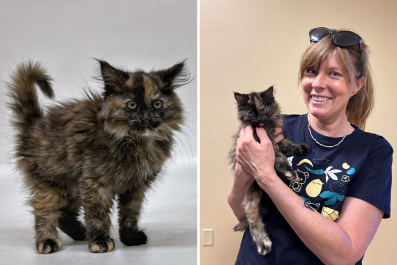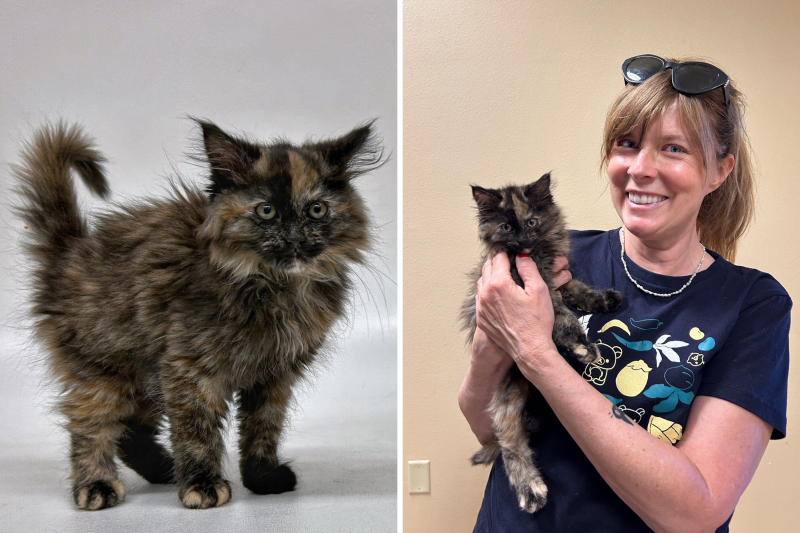
'Once-in-a-Career Moment' as Vet Realizes Rescue Kitten Is Super Rare
A routine spay surgery at the Humane Society of Central Oregon (HSCO) resulted in an extraordinary discovery when the veterinary staff realized that a tortoiseshell kitten named Cindi was actually male, a very rare occurrence in the feline world.
Tortoiseshell cats have a distinctive coat pattern featuring a mix of black, orange and sometimes white. This pattern is linked to the X chromosome. Female cats, having two X chromosomes, can display both black and orange colors if they inherit different color genes on each X. Males, with one X and one Y chromosome, are usually either black or orange but not both.
Therefore, male tortoiseshell cats are extremely rare, often a result of genetic anomalies like Klinefelter syndrome, where a cat has two X chromosomes and one Y chromosome.

The rare kitten's journey began when he arrived at HSCO on April 30. The staff assumed Cindi, who now goes by Cinder, was female based on her external features. She and her litter mate were placed into a foster home, where they initially struggled with eating but soon thrived. Cindi was brought back to the shelter for a routine spay surgery to prepare her for adoption.
During the surgery, Crystal Bloodworth, the HSCO's lead veterinarian, discovered that Cindi did not have a uterus or ovaries. Instead, she found two testicles. Because of these gonads, the kitten was reclassified as male and renamed Cinder.
"Determining to call the kitten a male is tough, but with the binary nature of animals and people's perception of animals, we chose male," an HSCO representative told Newsweek, speaking on Bloodworth's behalf.
The rarity of male tortoiseshell cats cannot be overstated. Only about one in 3,000 tortoiseshell cats is male, according to the website Catster. This makes Cinder a unique and extraordinary find in the world of feline genetics.
Cinder's story was initially shared by HSCO on Facebook earlier in June, highlighting the rarity of the discovery.
"HSCO's Clinic Manager, Bailey Shelton, CVT said 'it was like spotting a unicorn! Even though I've only been in the veterinary field for nine years, this very well could be a once-in-a-career moment," the post said.
On June 7, Cinder found his forever home with a family deeply involved in animal care. The family's daughter is studying veterinary medicine at the University of Wisconsin School of Veterinary Medicine, ensuring that Cinder will continue to receive excellent care.
Since his adoption, Cinder has been thriving, playing energetically and maintaining a healthy appetite. An HSCO representative said that Cinder's good appetite continues and that he is thriving in his new home.
The video has so far received almost 1,000 likes. One user, Adrienne Pavloff, commented: "We had a boy named Queenie! Same story. Was a girl until all of a sudden she wasn't. Made me think of the old song 'A boy named Sue'! He was a Queenie already in his head!"
Jenifer Schwartz Casey wrote: "What a beautiful kitten. I wish I could see he/she when they grow up! What a wondrous world we live in. Too bad we don't celebrate this type of uniqueness beauty in humans. My sweet torti/calico, Monet with her buddy Montana."
Do you have funny and adorable videos or pictures of your pet you want to share? Send them to life@newsweek.com with some details about your best friend and they could appear in our Pet of the Week lineup.
